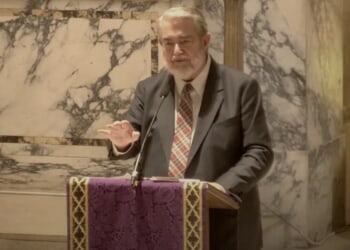On Monday, March 10, U.S. Secretary of State Marco Rubio told reporters that the direct talks between President Donald Trump’s hostage negotiator, Adam Boehler, and the Hamas leadership in Doha last week were a “one-off” situation and “hasn’t borne fruit.” Rubio’s statement was made just before jetting off to the Middle East to discuss, among other things, the reconstruction of Gaza and a future for the region without Hamas with Saudi Crown Prince Mohammed bin Salman.
The secret talks between Boehler and Hamas last week broke a decades-long precedent of U.S. officials not negotiating with terrorist organizations, which the U.S. State Department designated Hamas in 1997. Boehler’s objective was to broker the release of Edan Alexander — the last American-Israeli hostage in Gaza, who is injured — and the bodies of American-Israelis Omer Neutra, Itay Chen, Gadi Haggai, and Judith Weinstein.
President Trump backed the talks, stating that they are working to resolve the hostage issue for both the U.S. and Israel. “We’re not doing anything in terms of Hamas. We’re not giving [Hamas] cash […] You have to negotiate. There’s a difference between negotiating and paying. We want to get these people out,” Trump stated.
The covert Doha talks hit a snag when they were exposed — leaked, perhaps by Israel. Israeli media Ynet reported on March 5 that Jerusalem was “shocked” and “not happy” upon finding out that U.S. officials were meeting directly with the terrorist leadership and that Israeli officials leaked the news to sabotage the negotiations. Whether by Israel’s doing or not, by the next day, the negotiations in Doha were over, with no progress toward the release of American hostages made.
While Washington claims it informed Israel of Boehler’s move ahead of time, Israeli Prime Minister Benjamin Netanyahu claims he only found out about it after the fact.
The effort to sabotage, according to Israeli media, was out of fear that the Trump White House would shift priorities away from the war in Gaza and the remaining hostages if Alexander was released in a separate deal. Leaking the talks was Jerusalem’s way of keeping Trump active in the game. According to Israeli Strategic Affairs Minister Ron Dermer, the White House has assured Israel that such covert talks “won’t happen again.”
The news leaked the same day President Trump invited to the White House eight of the 33 Israeli hostages who were released last month as part of Phase One of the current ceasefire agreement between Israel and Hamas. In the Oval Office, Trump heard horrific accounts of abduction and abuse and said that he could not believe the stories and was surprised that no one in Gaza stood up to help them. (RELATED: No Woman Left Behind: The Global Feminist Betrayal of Israeli Victims)
The actions by Hamas come as no surprise, but the President’s disappointment in the moral compass of the Palestinian people in Gaza reflects what many, such as Liel Leibovitz, had hoped to see:
We hoped that the Palestinians of Gaza will show something of the courage we had seen in Syria […] We hoped for a Palestinian Oskar Schindler, one righteous man or woman who would stand up to Hamas […] We offered large monetary rewards and safe passage to anyone delivering any information about our hostages; hatred spoke louder than self-interest and cash.
Since meeting with the released hostages, the Trump administration issued a new “final warning” over social media, demanding Hamas to release all hostages “or it is OVER for you,” adding that the U.S. is “sending Israel everything it needs to finish the job.” The social media post essentially reiterated the same unenforced ultimatum from a month ago, what some commentators now see as a political bluff to pressure regional Arab leaders to abandon their support for Hamas.
The impasse reached between Boehler and the Hamas leadership last week is indicative of the current stalemate looming over the ceasefire between Israel and Hamas. The first phase of the ceasefire brokered on Jan. 19 expired on March 1 after six weeks of relative peace and the release of 33 Israeli hostages from Gaza in exchange for 2,000 Palestinian prisoners held in Israeli prisons on charges of terrorism or murder. Since the beginning of March, all negotiations for moving forward have stalled out. (RELATED: Mistreatment of Hostages and Prisoners Fracture the Ceasefire)
Hamas has demanded a direct transition into the second phase, which calls for a full withdrawal of the Israel Defense Forces (IDF) from the Gaza Strip in exchange for the remaining 24 living Israeli hostages, as stipulated in the January negotiations. The living hostages are the only leverage Hamas has to expel the IDF from Gaza, which would ensure their existence and signal victory.
As Hamas political adviser Taher Al-Nono expressed to Boehler in Doha, it is only under the condition of Phase Two that they would release further hostages, including Alexander. “If there isn’t a clear deadline of the end of the war and a full withdrawal [of the IDF], the release of all the hostages can’t be expected,” Hamas expressed.
Entering Phase Two, however, is exactly what Netanyahu has been trying to avoid. Netanyahu’s objective all along has been to completely dismantle Hamas’s political and military position alongside rescuing hostages. This controversial priority has set the prime minister against many officials in Jerusalem and large segments of the public, who feel that cutting any deal to retrieve hostages should be first and dealing with Hamas second.
Initiating Phase Two will bring hostages home but at the expense of allowing Hamas to regroup and fight another day. Instead, Netanyahu proposed an “extension” of the first phase that keeps Israeli boots on the ground — especially in the Philadelphia Corridor and along the Egyptian border — and continues the exchange of hostages for Palestinian prisoners. Hamas rejected this proposition outright, calling it a violation of the ceasefire terms.
Neither side can reach an agreement, and while negotiations falter, the resumption of war looms on the horizon.
READ MORE from Bennett Tucker:
Mistreatment of Hostages and Prisoners Fracture the Ceasefire







![NCAA Champ Salutes President Trump After ‘BIGGEST UPSET IN COLLEGE WRESTLING HISTORY’ [WATCH]](https://www.right2024.com/wp-content/uploads/2025/03/NCAA-Champ-Salutes-President-Trump-After-‘BIGGEST-UPSET-IN-COLLEGE-350x250.jpg)









